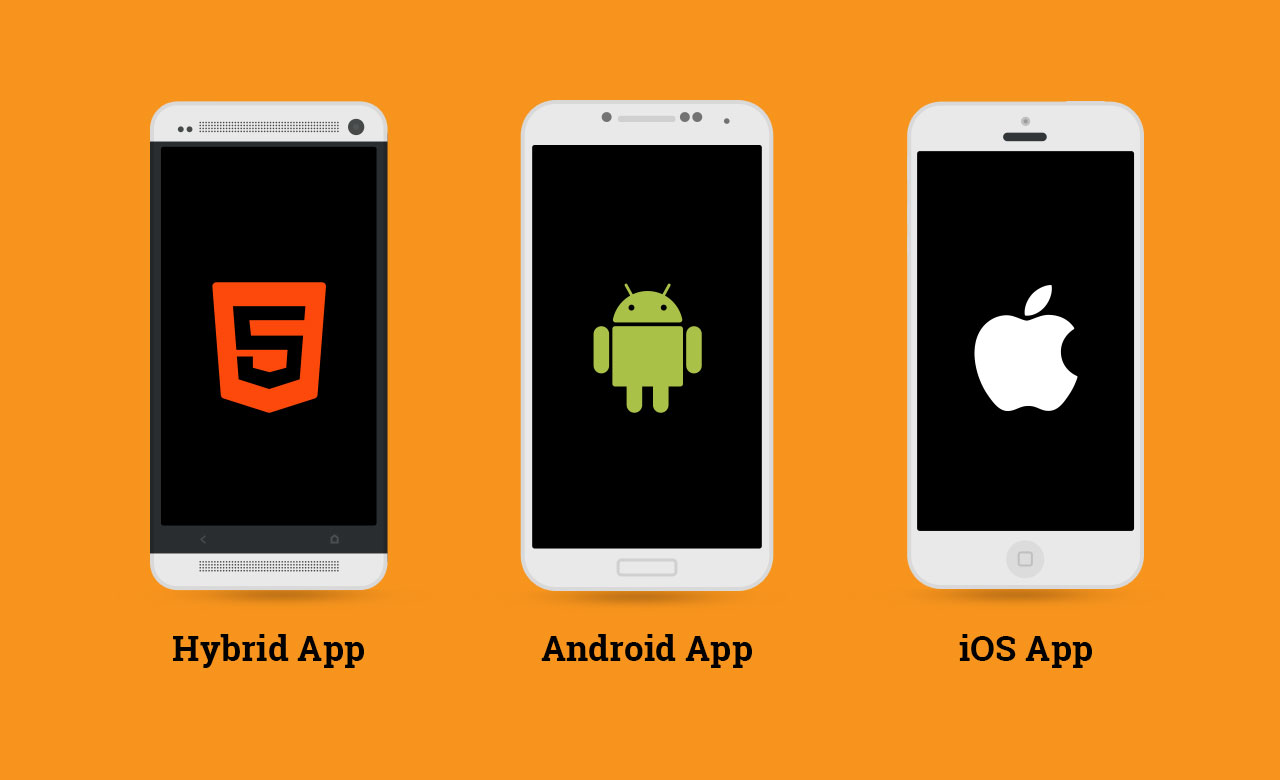A mobile device has evolved from just a communication tool to a highly effective business tool over the years. As technology is advancing at lightning speed, with that people are getting more addicted to mobile phones, tablets & other smart devices. The Importance of Mobile Apps in Business has climbed the ladder to the top rapidly in past few years. Mobile devices changed the way businesses work. High speed data access & excellent user experience are the keys to the high growth. Mobile apps made it easier for users to get any business information at their fingertip and stay connected to their favourite brands. That’s why a lot of businesses are taking their presence to mobile platforms.
The mobile app market has reached close to $30 billion in revenue according to a study report. Irrespective of the huge number, the app market is still in early stages and has plenty to offer. Every business owner, small or big, must own up to the fact that with the current rate of technology adoption, no business should be marketed offline alone. Today, mobile marketing is more effective than ever and brings numerous benefits, even for small benefits. Owners of small businesses must adapt to technology trends and stand to gain by developing a mobile application for their business.
However, before a business jumps into the ocean of mobility, there are few questions which need to be answered.
Does Your Business need an App?
This is the first question that you should ask yourself before deciding whether you need a mobile app or not for your business. Business apps are not always for selling products or solutions. Keep this thing in mind. You can use a mobile app for various purpose. If you are into retail business, a mobile app can be very helpful for sales. If you are into telecom business, an app can be helpful for customer engagement & support. An app can help your users understand your offerings and benefits more.
Similarly, not every business requires their own mobile application. Let’s take the example of a manufacturing company who are dealing with leather or garment. They might require an app to collaborate their entire operation instead of making it available to the public.
Type of App
If as a business owner you have decided to build a mobile app for your business, then next you have to figure out the reason behind building the app or in other words type of app. This is where your product managers should step forward. To build a successful mobile application, a robust app strategy is required so that the business can identify the purpose of the application and how it can help their users as well as their business growth.
It is always tough to decide whether your business needs a Mobile App Development or a Mobile Website Development. Both of these are completely different from each other when it comes to target audience. A mobile website is just a mobile version of your business website, where anyone can browse your business information, on the other hand a mobile app can be helpful to increase your product visibility as well as sales.
The next thing to consider will be the role of the app in your business. If it is holding a core position in your business, then the business should monetize the application. Initially, you can launch a free version & never forget to add awesome features which can tempt users to upgrade. Don’t advertise other businesses often, as it might decrease your app download ratio. Features like geo-location based services, call-to-action options, easy contact options can make the app more user-friendly.
Platform Selection
One of the biggest Challenge in Developing a Mobile Application is that the app market is widely fragmented. You have iOS and Android as primary options. While iOS powers iPhone, iPad; Android powers various devices. There are also many less famous platforms. Usually, businesses choose any of these paths: iOS, Android or HTML5.

iOS and Android are market leaders because they have a good number of user base. Android usually provide free apps, while iOS users are used to getting features at the expense of few dollars. If you are going for Android apps, then you need to make plans to make a profit out of that.
Another option is HTML path. It supports any kind of smartphone. It is also a cross-platform option which businesses can focus and use some of the few services that can deliver different versions for different platforms. To engage a large number of users, businesses can go for the HTML5 approach. But HTML5 apps are usually slower as compared to other platform apps.
Before selecting the platform, you should always keep one thing in your mind. Who is your target audience and who are going to use your app. Do a research & find which platform they prefer and build your app on that basis.
How to build?
This is one of the most important aspects of your business mobile app. There are many businesses in the history who failed to build the right app at first attempt and as a result, their app got vanished from the market. Instead of depending on the IT team of your company, do consider outsourcing the application development to a reliable technology partner. Through a right technology partner, you can make sure that your app will run with minimal glitches. In Apogaeis, we make sure our developed apps avoid glitches. We code in a secure manner so that your app won’t face any difficulties.
After choosing the right developer, make an NDA (non-disclosure agreement) approved so that your concept is secure. Discuss as much as possible with your technology partner. Make them understand what exactly you expect from your app and see the prototype before the start of actual development. You can keep adding features at the right time.
QA
When the first part of the app is done, before making it live- test properly. Check all the features and functionalities. Hire beta testers so that they can identify bugs & design flaws. If your users get the impression of an unpolished app, then it won’t take much time for them to delete your app from the mobile. Performance testing, usability testing, functionality testing, installation testing are few major testing items. Compatibility testing is very crucial so that your app can work and displayed correctly on each of the platforms that you targeted.
Why Customers & Companies Prefer Apps over a website?
The days are gone when users use to search websites for information. They need everything personalized and fast. Users prefer to download the mobile app and perform all the activities through those apps. They need access to information whenever they want.

Companies have understood this and started giving importance to business apps, as the popularity of app using is increasing. There are various reasons why customers prefer apps over a website. Let’s highlight some of the key points;
Customization
Websites cannot be customized. The information, offers and features everything is same for all the users. On the other hand, mobile apps are highly customizable and provide much better user experience. Functionalities like location tracking, customized information sharing ensures more user engagement. Push notifications are paying a major role in conversion. Discounts, offers or even special offers related information can lead a user to purchase a product. Nowadays, the moment someone downloads the app, a very high level of user engagement activities started. The best example can be of Uber. Businesses can communicate more effectively as well as they can make a customer feel special with exclusive offers.
Quick Service
Today’s generation of mobility is extremely obsessed with speed and quick customer service. Businesses are giving a lot of importance to the speed of their app as well as design. Businesses are now focusing on developing functionalities which can run in offline mode also. Facebook recently updated their iOS app, which allows users to create posts without the internet. They are working on updating this with android also. Telecom companies provide in app 24*7 customer support. Users can connect with the support team instantly through the app. Uber also provides all the information related to the ride as well as past rides with a go. Users expect this type of service. In the case of a website, these functionalities are far from expectation. Handiness is the best part of an app. Update information can appear on the screen.
Accessibility
Custom Mobile Apps are easier to access, unlike a website. As applications are coming with user-friendly interface and easy finding information, it has become easier to access whenever and wherever you want. If the website is not mobile friendly, it becomes very difficult to manage information. Businesses should understand the challenges involved in developing an app which can be accessed swiftly by the users.
In-App Community
One thing every user will check before using or while using your app- Your app reviews & other user comments. Users are motivated by other users, not by what you are telling them. Try to create a community of your users so that they can interact with each other. Listen to them & find solutions for common issues. You can ask the question- You can do it through social media also. Yes, you can, but creating an in-app community can increase you app traffic & that what you want. Which is not possible in case of a typical website.
Use your in-app community to offer contextual and customized content to your users, sharing tips and tricks, and giving them a platform to network with each other – that will further complement their experience in your app, boosting its retention rates. Remember a perfect Mobile Application for your Business can change fortunes. If you are able to manage your app & engage your audience, your app can be a successful bet for your business growth.
I can’t overstate how mobile is changing how we interact with our customers, we have to embrace these changes
Joel Anderson, CEO of Walmart
User Engagement
The best strategy to grow your business is to care about your user suggestions & their feedbacks. For this, you need to be very active as a service provider & also in resolving user related issues. This became easy through an app. Share content with your users across various channels only what they want to see. Run customized campaigns and reach your target audience.
Collect all the data points from what they provide you as a feedback, try to incorporate as many of their suggestions in your app. Of course, you have to think which one is feasible for your business. But keep users in the loop of your optimization, provide them with a better experience every next time, and see your retention rates soar up.
Call-to-Action
The reason behind companies adopting a mobile strategy is to increase their brand value as well as to use it as a source to maximise revenue. If you have a kickass mobile marketing strategy and enable your users to visit your application more often, you need a call to action option to convert the visit into customers. Customers are spending less time in decision making before purchasing anything. A call to action option can simplify the process and you can add revenue quickly.
Mobile Scheduling, Reminders, Payments
Mobile apps have various features for various industries. E.g. you are into service industry like online food retail, healthcare, salon, spa, laundry etc. A mobile app can be helpful for your target customers to book an appointment. Then you can use push notifications or messages to update them about their appointment. Mobile payment is one of the most popular online payment option now-a-days. Small businesses can integrate payment option in their mobile app and can collect direct payments through credit cards, debit cards, online payment or payment through any third party. Mobile payments are user friendly, secure and very fast.
Analytics
Mobile Analytics is a blessing for any business. You can have a 360-degree view of your entire business process. You can keep track of emails, contacts, appointments, team meetings, projects, financials etc. Sale support analytics can be added, which can automate your entire sales lifecycle and your sales team can close more deals quickly. A mobile analytics solution integrated with your business app saves time, gives you real time actionable insights, looks more organized and can optimize overall productivity. It can be proved as a perfect growth model for your business.
Wrapping up
In the era of smartphones, just having an up and running website is not enough. According to a recent study, it has shown that more than 45% of Google search results are originating from smartphones. The number is impressive and so is the growth of mobile industry. The need of being available on every Internet enabled device has given birth to mobile application development, which signifies the core development of an app specifically for the smartphones and mobile devices.
Hope now you understood the importance of mobile apps in business. So, how are you planning to start? You have two options. Either you build it by yourself by hiring experts or you can outsource it to specialists who has already build market leading mobile applications. Either way, you plan, a mobile app is going to be a standard component of any business in the future. The mobile strategy you make today is going to decide your future credibility.
Apogaeis is a world class Mobile Application Development Company. Our team of android and iOS developers built many innovative and user centric mobile applications for all kind of industries and businesses. We create long term value for our clients by identifying both risk and opportunities in the market. Feel free to talk to our consultant, do not hesitate to as for consultation, it is FREE. We will give your idea a mobile touch. Contact Us now and share your idea.
ALSO READ : “Mobile Application Development: Top 10 Factors to Consider”










